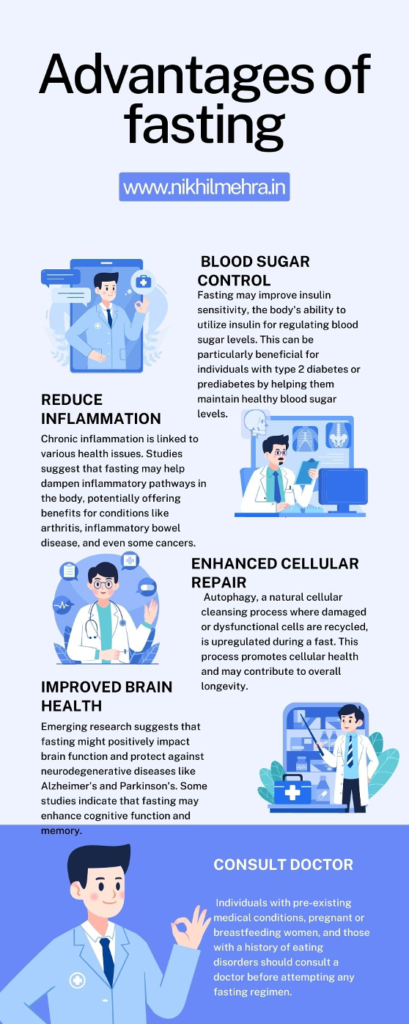
-
Posted By nikhilmehra
-
-
Comments 0
Fasting, the voluntary abstinence from food for a set period, has been practiced for millennia for religious, spiritual, and health purposes. While its historical roots are undeniable, the scientific understanding of fasting’s impact on human health is a relatively recent development. This article explores the different types of fasting regimes, the physiological changes that occur during a fast, and the potential health benefits currently under scientific investigation. Today, scientific studies are delving into the physiological changes that occur during a fast and their potential impact on human health.
What are the Varieties of Fasting Practices
Fasting protocols come in various durations and intensities. Here are some of the most common:
- Water Fasting: This complete abstinence from all food and caloric beverages (excluding water) is the most extreme form of fasting.
- Juice Fasting: This method involves consuming only juices made from fruits and vegetables.
- Broth Fasting: Clear broths made from bones and vegetables are the sole source of sustenance during this type of fast.
- Intermittent Fasting (IF): This umbrella term refers to various eating patterns that cycle between periods of eating and fasting. Popular IF protocols include the 16/8 method (fasting for 16 hours and restricting eating to an 8-hour window) and the 5:2 diet (eating normally for 5 days and restricting calories to 500-600 on 2 non-consecutive days).
- Eat-Stop-Eat (ESE): This involves abstaining from all food for 24 hours once or twice a week.
There’s a lot of misleading information out there about fasting. Here are some common myths and the science-based counterpoints:
Myth #1: Fasting is starvation and will make you lose muscle.
Counterpoint: Fasting is a controlled period of not eating, while starvation is a prolonged state of nutrient deficiency. During a fast, the body prioritizes burning stored fat for energy before breaking down muscle tissue. While some muscle loss might occur during extended fasts (over 72 hours), proper refeeding strategies can help minimize this.
Myth #2: Fasting is only for weight loss.
Counterpoint: While weight management is a potential benefit, research suggests that fasting may also improve blood sugar control, reduce inflammation, enhance cellular repair (autophagy), and promote brain health.
Myth #3: Fasting detoxes your body.
Counterpoint: The body has its own detoxification system, including the liver and kidneys. While fasting might reduce your overall toxic load if you were previously consuming processed foods, it’s not a replacement for proper liver and kidney function.

Potential Health Benefits of Fasting
While research on fasting is ongoing, several promising areas of investigation suggest potential health benefits:
- Weight Management: Fasting can be a valuable tool for weight loss by promoting a calorie deficit and potentially increasing metabolic rate.
- Improved Blood Sugar Control: Studies suggest that fasting may improve insulin sensitivity and blood sugar regulation, potentially benefiting individuals with type 2 diabetes or prediabetes.
- Reduced Inflammation: Chronic inflammation is implicated in various diseases. Fasting may dampen inflammatory pathways, offering potential benefits in conditions like arthritis, inflammatory bowel disease, and some cancers.
- Enhanced Cellular Repair: Autophagy, a natural cellular cleansing process, is upregulated during fasting. Autophagy helps remove damaged cellular components, potentially promoting cellular health and longevity.
- Improved Brain Health: Some studies suggest that fasting may enhance cognitive function and protect against neurodegenerative diseases like Alzheimer’s and Parkinson’s.
Physiological Changes During Fasting
When the body enters a fasted state, a metabolic switch occurs. Blood sugar levels (glucose) decline, prompting the body to seek alternative energy sources. Here’s a simplified breakdown of the physiological cascade:
- Insulin Levels Drop: In the absence of dietary intake, insulin levels decrease. Insulin is a hormone primarily responsible for shuttling glucose from the bloodstream into cells for energy production.
- Glucagon Rises: Glucagon, a hormone produced by the pancreas, has the opposite effect of insulin. It stimulates the liver to release glucose stores into the bloodstream, maintaining blood sugar levels.
- Shift to Fat Burning: After several hours of fasting, the body starts accessing stored fat for energy. This process, called ketosis, results in the production of ketones, which can be used as fuel by some tissues, including the brain.

Safety Considerations and Medical Supervision
While fasting appears to hold promise for various health conditions, it’s crucial to approach it with caution. Here are some safety considerations:
- Pre-existing Medical Conditions: Individuals with certain medical conditions, such as diabetes, eating disorders, or a history of heart disease, should consult a doctor before attempting any fasting regimen.
- Hydration: Adequate water intake is essential during a fast to prevent dehydration and electrolyte imbalances.
- Electrolyte Supplementation: In some cases, electrolyte supplementation may be recommended, particularly during longer fasts.
- Gradual Refeeding: Breaking a fast with easily digestible foods is crucial to avoid gastrointestinal distress.
- Medical Supervision: Consulting a healthcare professional before starting a fasting regimen is vital, especially for individuals with underlying health conditions or those taking medications.
Conclusion
Fasting is an ancient practice experiencing a resurgence in popularity due to its potential health benefits. While research is ongoing, current evidence suggests that fasting may positively impact weight management, blood sugar control, inflammation, cellular health, and brain function. However, it’s vital to approach fasting with caution and under medical supervision, especially for individuals with pre-existing health conditions. Consulting a healthcare
About Me
Popular Tags
- #Stoicism
- autophagy
- cancer
- Classical music intervention
- EmotionalBalance
- fasting
- fasting benefits
- Gynecological surgery
- health
- health benefits
- healthcare
- healthy
- healthy diet
- HolisticHealing
- intermittent fasting
- lifestyle
- meals
- medical
- MedicationFreeLiving
- mental
- MindsetShift
- MultiModalApproach
- Music therapy
- nutrition
- Opioid alternatives
- Pain management
- PainManagement
- PatientEducation
- Personalized playlists
- Postoperative wellness
- postsurgery exercisse
- Step-by-step healing process
- vascular
- wellbeing


